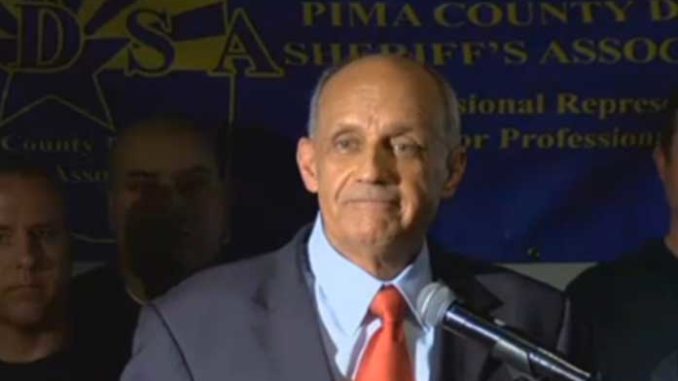
TUCSON – Dr. Richard Carmona has been tapped to lead the University of Arizona’s campus Reentry Task Force. Carmona, a former surgeon general of the United States, will head the development and execution of a return-to-campus plan for fall 2020.
Carmona, a controversial figure who ran a failed senatorial campaign in 2012, holds dual roles as a professor of surgery at the College of Medicine and a professor at the College of Pharmacy.
Carmona will report directly to University of Arizona President Dr. Robert C. Robbins.
Robbins announced in April his plans to resume in-person classes Aug. 24, bringing back 45,000 students and 15,000 faculty and staff for fall 2020. According to the University, the plan “hinges on a three-part Test, Trace and Treat approach that will guide the task force’s work, which is already underway.”
Carmona’s controversial past as an administrator at Kino Hospital came into sharp focus during his 2012 run.
During the senatorial campaign Carmona went on the attack of Dr. Cristina Beato, who served as Acting Assistant Secretary of Health for the U.S. Department of Health and Human Services from 2003 to 2005, for her personal account of his abusive behavior. Dr. Beato recounted a night that Dr. Carmona angrily banged on her door in the middle of the night in a rage to continue an argument that he started earlier that day. Carmona’s surrogates went forth to smear Beato, and Carmona released his own ad defending himself against the allegations while demanding that Republican Congressman Jeff Flake pull his commercial from the airwaves.
Late in the campaign, Carmona released a false ad claiming that both senators McCain and Kyl supported him in the senatorial race. The two senators then released a statement calling Carmona’s ad “deeply dishonest.” The Arizona Senators said in a statement, “It is shameful for Richard Carmona to try to deceive the voters in this way.”
Female opponents cited his ‘bullying’ of a nurse who said he failed to diagnose a young boy’s skull fracture in 1991.”
After she complained to other hospital workers about Carmona’s failure to diagnose, Carmona demanded that she resign. The nurse struck a deal with Carmona, for a demotion in order to not be reported to the State Nursing board. Carmona reported her anyway.
In 1999 Health Commissioner Sylvia Campoy, a highly regarded professional, was antagonized and threatened by Carmona. She was doing her job by reporting another doctor’s drug abuse that Carmona supposedly “dealt with.” Carmona became irate that she reported him. Campoy said “I was screamed at; I was yelled at. I was told it was none of my business. I was told that I had breached peer review.”
Also, in 1999, an article in the Arizona Daily Star detailed Carmon’s failure while chief executive of the Pima Health Care System. The article called for Carmona’s resignation, due to his “weak leadership.”
The Star Editorial Board found “Carmona needs to go because Kino Hospital and the whole health system need radical change. Hemorrhaging tax money, paralyzed by conflict, the system has for the four years Carmona led it drifted further and further into crisis. To be sure, many of the system’s troubles predate Carmona….. the Carmona years have been disastrous years characterized by drift and squabbling the CEO never transcended. The ugly numbers of the county budget crisis alone implicate Carmona because they show the health system ran up at least $42 million in budget deficits – including $14 million in the last year – on his watch.”
The Editorial Board noted Carmona’s “irresponsible refusal to cut staff and costs during a fiscal crisis. So, too, did last week’s revelation that the health system last year may have added 200 or more employees in a year when it was already perhaps $30 million in the red and experiencing massive patient declines caused by a state cap on its indigent clients. The bottom line: Carmona’s record as a fiscal manager demands his ouster.”
